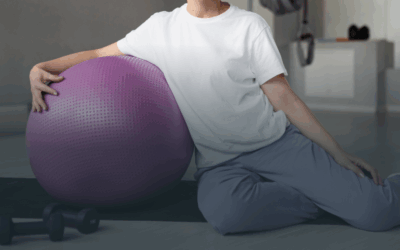Fighting Urinary Incontinence: Leaky Bladder Exercises & Simple Daily Habits
Urinary incontinence can feel frustrating and even embarrassing, but it is far more common than most people realize. Weakened or poorly coordinated pelvic floor muscles often contribute to a “leaky bladder.” The good news is that targeted exercises, relaxation...
How to Deal With a Weak Bladder Overnight
Waking up multiple times at night to urinate can be exhausting and frustrating. For many people, a physical bladder condition alone does not cause nighttime bladder issues. Stress, anxiety, diet, and lifestyle habits often play a significant role. Understanding how...
5 Ways To Strengthen Your Pelvic Floor
The pelvic floor plays a crucial role in core stability, bladder and bowel control, posture, and movement. Whether you are dealing with weakness, tightness, or pelvic floor spasms, strengthening and coordinating these muscles correctly can make a meaningful...
Nutrition for Bladder and Bowel Health
What you eat and drink has a direct impact on how your bladder and bowel function. Many people dealing with urinary urgency, frequent urination, overactive bladder, or recurrent urinary tract infections are surprised to learn that diet plays a major role in both...
What Happens to Your Pelvic Floor in Menopause?
Menopause and perimenopause trigger widespread changes throughout the body, not just in the reproductive system. Lower estrogen levels impact muscles, tendons, joints, and connective tissue. This is why many women see changes in the pelvic floor. They may also...
Incontinence and Depression
Living with urinary incontinence can be emotionally exhausting. For many people, it’s not just about bladder control, it’s about anxiety, embarrassment, and the constant fear of losing control in public. Over time, these feelings can spiral into depression, creating a...
How to Strengthen the Pelvic Floor
Pelvic floor strength plays a major role in bladder control, sexual comfort, bowel function, and overall stability in the core and hips. When the pelvic floor is too weak, sagging, or overly tight, people may experience pain, urinary leakage, difficulty with...
Incontinence in Men
Urinary incontinence is often talked about as a women’s issue, but millions of men also deal with leakage, urgency, and loss of bladder control. Whether it happens after prostate treatment, with aging, or due to pelvic floor weakness, male incontinence can affect...
Urge Incontinence Treatments
Urge incontinence, sometimes called “overactive bladder”, is a condition where a sudden and strong urge to urinate leads to accidental leaks. For many, it can feel frustrating and isolating. But the good news is that modern medicine offers a wide range of urge...
Incontinence Undergarments
Living with incontinence, whether it’s bladder leakage or bowel incontinence, can be challenging, but it’s not something anyone should feel embarrassed about. With today’s wide range of incontinence underwear, fecal incontinence pads, and bowel control products,...
What is Interstitial Cystitis?
Interstitial Cystitis (IC), also known as bladder pain syndrome, is a chronic condition that affects the bladder and surrounding pelvic area. It causes discomfort, pressure, and pain that can range from mild to severe. Unlike a regular urinary tract infection, IC...
How to Avoid Painful Bowels
Constipation is a problem that most people experience at some point in their lives. It’s uncomfortable, frustrating, and can even become painful when it happens often. From lifestyle habits to hormonal changes, many factors can slow down your digestive system and yes,...
Avoid Urinary Emergencies
Urinary problems are more common than most people realize, and when left untreated, they can quickly become emergencies. From sudden bladder pain to recurring urinary tract infections (UTIs) or cystitis, understanding how to recognize and prevent these issues is key...
Dealing with Bowel Leakage
Bowel leakage, or fecal incontinence, can be one of the most uncomfortable and embarrassing health issues to experience. It can affect people of any age, though it’s more common in older adults and those with digestive or neurological conditions. Beyond the physical...
Anxiety and Incontinence
It’s no secret that stress can take a toll on both the body and mind. But what many people don’t realize is how closely anxiety and urinary health are connected. From frequent urges to the feeling of losing control when laughing, coughing, or exercising, emotional...
Incontinence Surgery News: Surgery Tops Muscle Training for Incontinence
Urinary incontinence affects millions of people, disrupting daily life and confidence. For many years, the main advice has been pelvic floor exercises and physical therapy for bladder control. These techniques can help strengthen muscles and improve symptoms. However,...
Myths About Incontinence
Urinary incontinence is often surrounded by stigma and misinformation. Many men hesitate to seek help because of embarrassment or because they believe common myths about the condition. The truth is, incontinence is more common than most people think, and there are...
Natural Remedies for Incontinence
Urinary incontinence can be frustrating and even embarrassing, but it’s also more common than many people realize. Millions of men and women experience bladder leaks, urgency, or difficulty holding urine at some point in their lives. While medical treatments exist,...



















